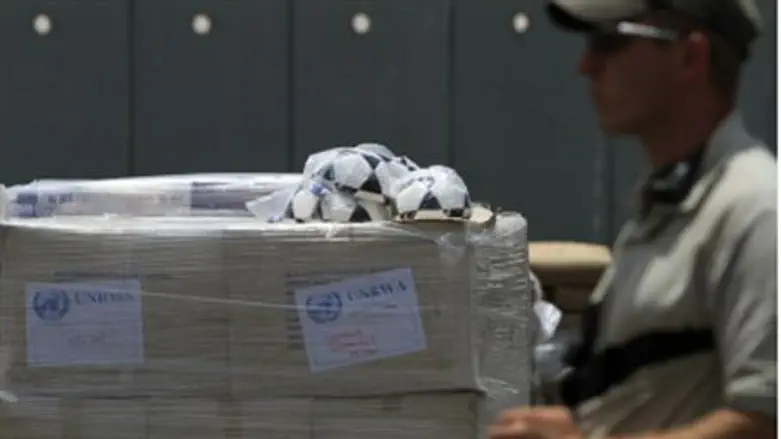
The IDF is coordinating efforts with the Fatah-led Palestinian Authority to re-install it in Gaza and improve life for Arab residents there, without involving the Hamas terrorists who maintain a chokehold on the region.
While slowly relaxing restrictions on imports and exports in and out of the region, Israel is also beginning to give a green light to private construction projects in tandem with approvals issued by PA Prime Minister Salam Fayyad.
However, the tight relationship with Fatah may come at the cost of Israel's defense; Fatah itself also fired thousands of rockets at the Jewish State prior to its war with Hamas, and continued to target Israel after its ouster from the region.
At present, Fayyad’s Ramallah-based government coordinates shipments to Gaza with Israel, and Gaza business owners accept the items for delivery at the Kerem Shalom Crossing. Israel resumed allowing the import of most consumer goods into the region earlier this year, after an embargo that began when Hamas seized control of Gaza after winning a bloody militia war against the rival Fatah faction in June 2007.
The exceptions are dual-use items that could be employed to create weapons – such as sheet metal that Hamas can use to manufacture missiles to aim at Israel. Also banned are terrorists, as well as any form of ammunition, weapons and other ordnance, as well as illicit drugs.
Exports are also limited, although Gaza farmers do a brisk business in the region’s famous cut flowers and strawberries.
According to IDF Major-General Eitan Dangot, military coordinator for Judea, Samaria and Gaza, there are plans to increase the import of more raw materials into Gaza to beef up the region’s textile, furniture and agricultural industries. Dangot told the Associated Press that the IDF also hopes to allow Gaza business owners to release more exports by early spring.
An increase in private construction and relaxed restrictions on the import of concrete, steel and other building supplies may also be coordinated with the Fayyad government, Dangot said. At present, building is only carried out through international aid projects.
Fayyad has repeatedly called on Israel to end its blockade of Gaza, which was implemented and remains, due in part to the June 2006 abduction of IDF soldier Gilad Shalit by Hamas terrorists.
Shalit, whose whereabouts and condition is unknown, is still being held by Hamas. The terrorist group has repeatedly rejected numerous prisoner swap deals involving more than a thousand jailed terrorists -- including hundreds of murderers with "blood on their hands." Last month a German negotiator returned to the region to renew talks for the soldier's release, but no further details have been made available. Neither Fayyad nor PA chairman Mahmoud Abbas have made any efforts to pressure Hamas to release Shalit.
Hamas is deeply critical of Fatah’s coordination with the IDF and is actively working to sabotage the Fayyad government. Hamas has been encouraging the grassroots population in Judea and Samaria to replace him with a more hard-line leader who opposes talks with Israel.
The green flags of Hamas and the Islamic Movement are often seen flying from the power lines above the road on Highway 60 where it passes through Hevron, Halhul and Beit Umar in Judea.